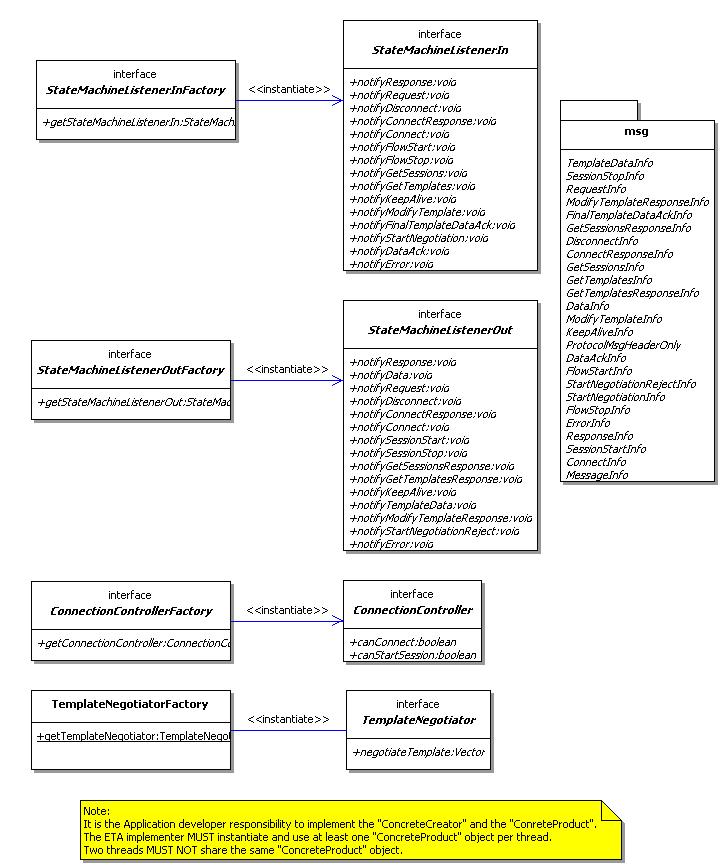
|
||||||||||
| PREV PACKAGE NEXT PACKAGE | FRAMES NO FRAMES | |||||||||
This package contains the creators and the products (callback object) interfaces that enable to monitor and control the underlying protocol ("Factory Method" design pattern).
See:
Description
| Interface Summary | |
| ConnectionController | The interface enables to control the ability of establishing a connection and session start state in a connection. |
| ConnectionControllerFactory | This interface is the ConnectionController factory. |
| StateMachineListenerIn | The interface provides a convenient way to get a notification with regards to incoming events |
| StateMachineListenerInFactory | This interface is the StateMachineListenerIn factory. |
| StateMachineListenerOut | The interface provides a convenient way to get a notification with regards to the underline protocol outgoing events |
| StateMachineListenerOutFactory | This interface is the StateMachineListenerOut factory. |
| TemplateNegotiator | The interface enables to custom templates negotiation. |
| Class Summary | |
| TemplateNegotiatorFactory | This interface is defining the TemplateNegotiator factory. |
This package contains the creators and the products (callback object) interfaces that enable to monitor and control the underlying protocol ("Factory Method" design pattern).
The API will enable the application level to listen and influence the underlying protocol level using callback objects mechanism

ETA exposes the "send request" and "send response" services via the ExporterManager interface and enables the application developer to wait for responses and requests from the collection system via the callback mechanism by implementing the StateMachineListener interface.
The Request/Response mechanism is currently not supported in IPDR/SP, but it is expected to be supported in the next version of the IPDR/SP.
The following sequence diagram depicts a typical event request/response process

1. The Application set the ETA implementation configuration.
2. The Application set the incoming events listener factory (the ETA will use it to instantiate specific "incoming events listener" callback object whenever it needed and at least once per thread). The "incoming events listener" object will enable handling asynchronous requests and responses.
3. The application invokes the open method in order to initialize the ETA.
4. The ETA implementation load the configuration
5. The ETA implementation instantiate incoming events listener and register it as listener.
6. And it initiates session with the ETA compliant server according to the configuration.
Request Scenario:
7. The Application initiate request
8. The ETA implementation sends the request to the ETA-compliant server using IPDR/SP.
9. The ETA-compliant server sends the response to the ETA implementation using the IPDR/SP protocol.
10. The ETA implementation is notified of the response to the Application, using the listener callback object.
Response Scenario:
11. The ETA-compliant server initiate request using IPDR/SP.
12. The ETA implementation is notified of the request to the Application, using the listener call-back object.
13. The Application initiates response.
14. The ETA implementation sends the response to the ETA-compliant server using IPDR/SP.
|
||||||||||
| PREV PACKAGE NEXT PACKAGE | FRAMES NO FRAMES | |||||||||